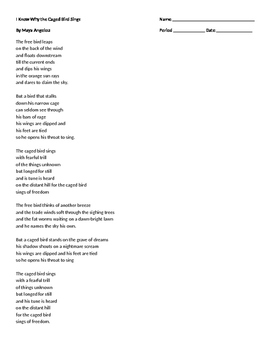

One of the most outspoken comes from the late James Baldwin, Angelou's friend and mentor: "This testimony from a black sister marks the beginning of an era in the minds and hearts and lives of all black men and women. Nominated for a National Book Award in 1970 and labeled by reviewer Wanda Coleman as Angelou's "magnum opus," I Know Why the Caged Bird Sings, a modern classic among young adult and adult readers, has earned varied kudos.

The circuitous pilgrimage in search of unconditional belonging ends with motherhood, ironically the failed source which precipitated Maya's soulful odyssey.

Through a tournament list of crises, young Maya moves from near-orphanhood to a rebirth of self, complete with a generous perception of worth and dignity. Disclosing her version of the black female's victimization by prejudice and powerlessness, as though creating a fictional character, she champions Maya's ability to compensate for displacement, disparagement, lack of stability, and savagely truncated self-worth. Determined to transcend facts with truth, she concentrates on the Maya character's rationale and thought processes that presaged her adult character, both as woman and survivor. Piqued by a dare, Angelou approached her first book as an exercise in autobiography as art, a literary achievement which, according to Random House editor Robert Loomis, is virtually impossible.


 0 kommentar(er)
0 kommentar(er)
